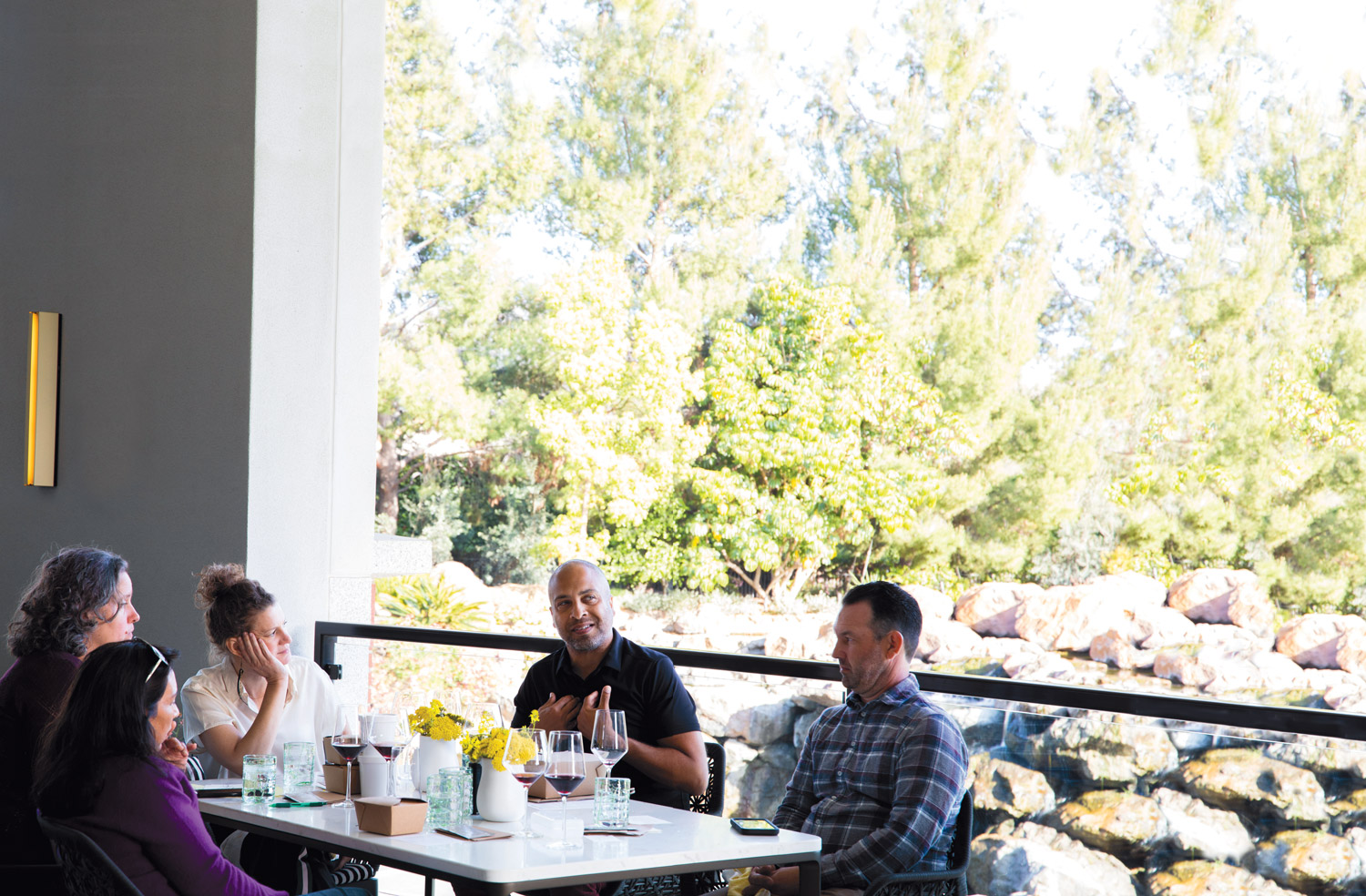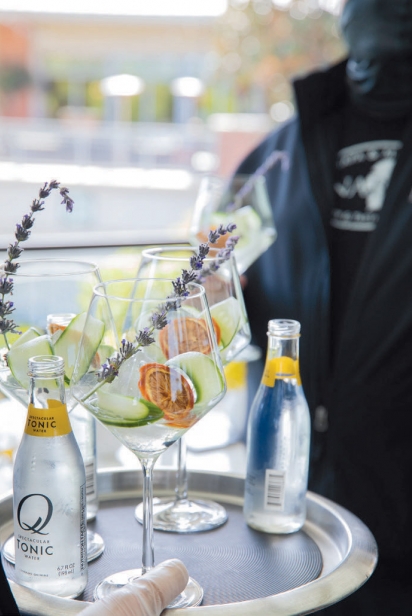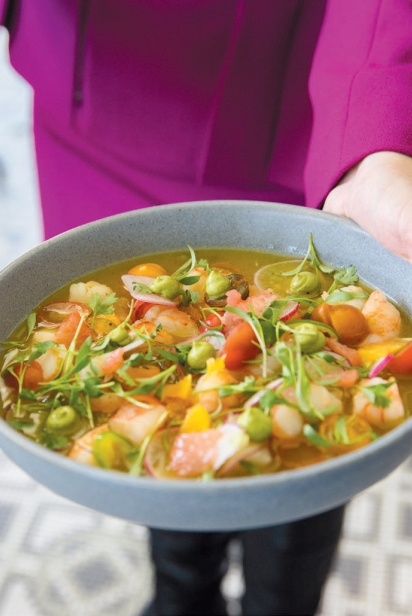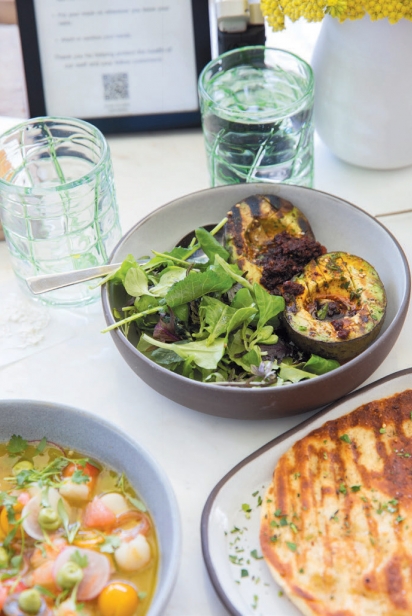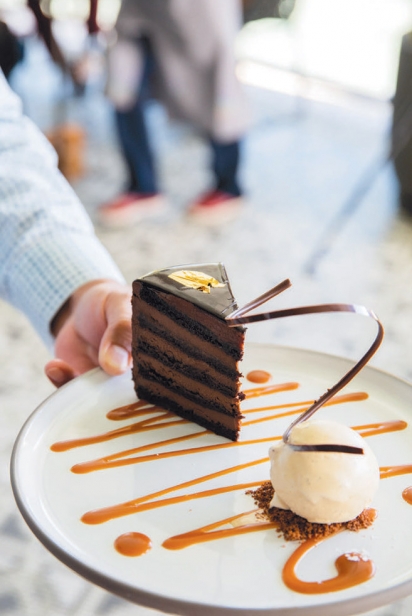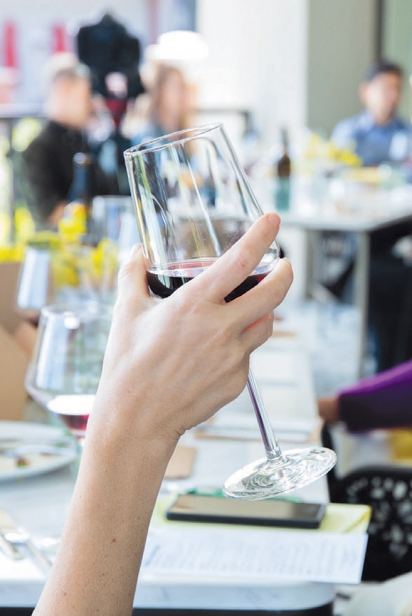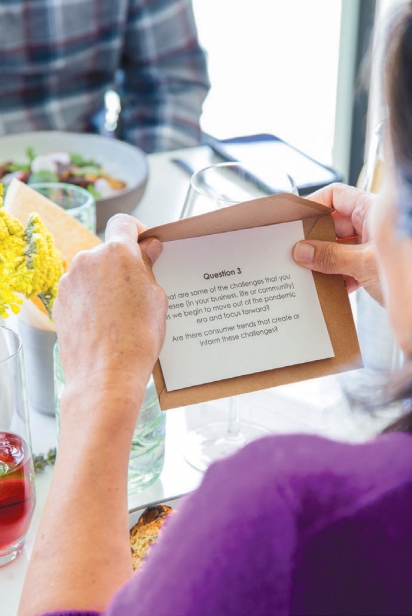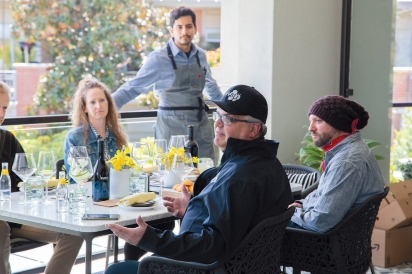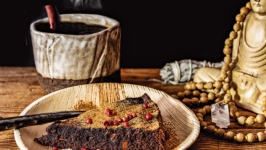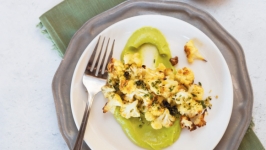Moving Ahead Together
Supporting the local food community in the post-pandemic era
On a gloriously sunny day in mid-April, socially distanced on a patio overlooking a beautiful waterfall, Edible Ojai & Ventura County and Coin & Candor in the Four Seasons, Westlake Village, co-hosted a small gathering of innovative small-business owners who contribute to Ventura County’s robust food community. During an impressive meal, including locally sourced ingredients, created by Coin & Candor’s Executive Chef Jesus Medina, these local thought leaders shared experiences and ideas generated from the past year of pivoting to stay afloat.
Joining us were Henry Tarmy of Ventura Spirits, Gabrielle Moes of Seasons Catering, Nicole Facciuto and Eric Quinn Hargrove of CORKY’S NUTS, Michael Roberts of Farmivore, Greg Barnett of NABU Wines, Sarah and Shawn Pritchett of Ragamuffin Coffee Roasters and Jesus Medina.
Here are some highlights of that conversation in the hopes that you, too, will be inspired, as we enter a post-pandemic era. (Answers have been edited for space.)
Personally or professionally, what is the most difficult lesson you have learned over the past year? The most surprising?
Nicole Facciuto: For me, professionally, it was assuming that when something goes wrong with infrastructure that you don’t control, the people who are accountable for correcting the issue are actually interested in fixing it. Some of the specific difficulties we faced this year required us to learn to make some pretty big requests of our customers regarding significant changes in delivery times and overall fulfillment. The outcome, having those customers stand by us and tell us that everything is okay and that they would be ready when we are, was extremely rewarding and refreshing.
Michael Roberts: For me, the lesson is that we need each other. I’m excited that I want to lean on you all and I want you to lean on us. Community is very important and I’ve missed everybody. Especially here in Ventura County, being part of this amazing food community. I think we can do so much more together.
Greg Barnett: Our model was very music driven. On a Friday and Saturday for music nights, we would have 300–800 people come through our door and our wine sales were just insane. When the pandemic happened, we realized that we didn’t have our wine online. (Now we do have an online store.) This moment in time has taught us to become that winery that we are. We started delivering wine—I think a lot of people were just having me deliver wine so they could see me, because, you know, wine is social. That’s one thing I’ve really missed. Another thing we never had to do was reservations. Now, we are by reservation only, and we like it. I think the most difficult thing was getting the message out without the music. Just saying, “Hey, we’re still here!”
What are some changes in your business that you’d like to keep; what are the changes you can’t wait to be rid of?
Sarah Pritchett: During the lockdown, we decided to shorten our hours and run the floor with a smaller staff to save on labor costs. That meant that Shawn and I were working every day. But this decision allowed our team to work full days and still have time for family and self-care. I think it was an important part of keeping us all sane during a difficult time, and it helped us financially. It can be difficult to juggle, switching gears all the time, but it was nice to have that family time at the end of the day. We happily have all of our staff working full time again, but we have been slow to expand our hours. In time, we will, but we are keeping in mind their well-being as well.
Henry Tarmy: There were some regulatory changes for us that were really surprising and delightful, where the California ABC [Alcohol and Beverage Control] stepped in really early in the pandemic and said, “Alright, distilleries can now ship directly to consumers.” Distilleries had never been able to do this, so it was a huge gift for us. We had a lot to learn as far as just starting a shipping operation, but that is something I certainly hope to retain, as far as a legal privilege, and I think we probably will. Like so many things with COVID, it forced you to do something that regulators—or you yourself—would have said, “Oh no, that’s not possible, or practical or viable,” and then you do it and realize, “Oh, I guess this does work.” For example, shutting down Main Street and making it a walking promenade! Or realizing nothing crazy has happened because people are shipping liquor.
Shawn Pritchett: Community is such a huge part of what we do, and so vital to why we built Ragamuffin, to share good through that. We had to change the ways in which we approached that. Luckily, we had an idea that this was going to go longer (not this long) so we planned and worked really hard. Several months we worked every single day and we just did to-go orders. Every time the city or the state had changes, we just kept going. But to not be able to have the community inside has been hard for everybody involved.
What are some of the challenges that you foresee (in your business, life or community) as we begin to move out of the pandemic era and focus forward? Are there consumer trends that create or inform these challenges?
Shawn Pritchett: Now, to start getting used to being around people again, on the inside, welcoming people back in, I think the biggest challenge is just figuring out, “When? How?” Then juggling what expectations are. Other people are already opening up inside. And we aren’t. Everything happened so fast at the beginning and now it feels like it is happening again but in the reverse. So it is a juggle to figure out how we can keep being a blessing to the community through coffee and through relationships.
As far as consumers, when we opened before, people were still only coming out in their family units. I think now there are going to be business partners or people coming out and meeting at the coffee shop. People are learning how to interact again, and I think it’s going to be a challenge to lead in a positive way, to learn that and to create and deliver the best experience for our guests.
Sarah Pritchett: Yeah, I think the biggest challenge is being flexible. As business owners who have succeeded at keeping our business open through the pandemic, we had to be really flexible. We had to keep going when we were exhausted; to keep leading our teams and convincing them to come back to work and be excited and that it would be OK. I think I was sort of hoping that we would get back to reopening and everyone would be able to take a breath and it would be normal again, but there is no such thing as normal.
People have been asking me, “Aren’t you excited that things are opening back up?” and I just say, “I’m kinda tired.” I’m tired of being flexible and being a good sport, but there is no other choice.
For a small business, we have been trying to wear all the hats and trying to keep that energy alive. I think it is true, what Mike was saying: We need each other! I think we will need to be stepping outside our industry a little bit and asking, “How can we work together to be successful?”
Eric Hargrove: I think one of the challenges is going to be looking for opportunities outside of what we already know, and embracing those opportunities while looking for folks that we can collaborate with in new ways.
Gabrielle Moes: Oh, wow, challenges. I think it will be sticking to the boundaries we set for ourselves, getting this new business Good2Go really successful and hiring people! I am one in about 5,000 other businesses that is hiring wait staff and event directors and where is everybody? The food industry has totally changed. So many people have left our industry partly out of necessity, but they haven’t come back.
We also have all these new regulations. The government says we can have events now, but am I supposed to monitor every single guest who comes into a party for vaccination status to avoid liability? It is just constant piles and piles of paperwork figuring out what to do.
One more challenge would be social cues. Today I apologized for touching a spoon. It will be different with people we don’t know. I think we will navigate through, as we always do, so I try not to worry about that too much.
From pivot to pre-planning: What do you think the new “norm” will look like?
Sarah Pritchett: I think as much innovation as we saw in the last year, we are going to see as much, if not more, going forward. During the pandemic, we learned that you have to step outside of the box to survive. So even though we are moving into a time of being less restricted, there is almost more expectation. We always had the mission to make someone’s day better. That is our whole reason for being here. That is still very much a part of what we are about but now, what we realize that what people need from us is connection. I think we all realized that is the most important thing: At the core, we all need to be connected even if we’re forced to be apart. All of us here have food and beverage products that bring people together, because food gathers people. So what we are trying to do is shift our mind- set to be more than just a café that is only successful by bringing people in our doors. We are trying to evolve our model to be a place where people can connect and build relationships.
Nicole Facciuto: When the pandemic hit, there was a bit of a loss of control over a number of things. We looked at it and said, “Well, OK, everything is going crazy, so what do you want to create? How can we help? Swing big! What do we have to lose?” Each one of us has been dealt a crazy blow, and we’ve made it through, so far, and are still making it through a whole new way of doing things. So, why not? What else can we do?
Eric Quinn Hargrove: What I have been thinking about, moving forward, is initiating deeper or more frequent conversations with our customers to find out really “What do you need? How can we best serve you and support you, especially in the new era of ‘What now?’”
Henry Tarmy: Yeah, I think that is really important. It’s not like it was one way before, then we’ve been through this year and now it is going to be how it was. We’ve gone through this seismic shift, the dust hasn’t settled yet, but things absolutely will change. We’re going to carry some of this stuff, hopefully silver lining kind of stuff, with us. But what people want and how they buy things has fundamentally changed. For those who have been able to be flexible and really take this opportunity to learn, some of that—public health crisis aside—is kind of exciting.
How can consumers help?
Michael Roberts: One of our farmers, Inlakesh, says we need to be “functionally selfish.” So, if readers, our community, want the best our local community has to offer, if they want the highest nutritional value, if they want the freshest produce available, they should get it from us! They should be functionally selfish. They should demand and want the best and they should support the best in their community to whatever degree is possible for them.
Greg Barnett: Yes, support local wine for sure. We always said we’d never reopen unless we felt safe. There’s going to be a lot of stuff we won’t be doing, and new things we had to do that we will keep in place, for the foreseeable future, just to stay safe. So, come on out, enjoy our wines and listen to music outdoors.
Nicole Facciuto: I think what consumers could do is really realize that they can choose to make a difference with their hard-earned dollar and actively seek to buy local where they can. In order to create a space that “helps the consumer to help”, it is our responsibility to educate our customers about our products and why they should support us, and how it might benefit them and their community.
Eric Quinn Hargrove: I think we need to create ways to empower our consumers to authentically share about us, to give our products as gifts, to be inspired by our stories (and why we do what we do), and share that with their immediate community. I would love to see people really own what they consume; that it, in some ways, speaks to who they are; that by sharing what they buy, especially their food, it allows them to share some of who they are in the world.


